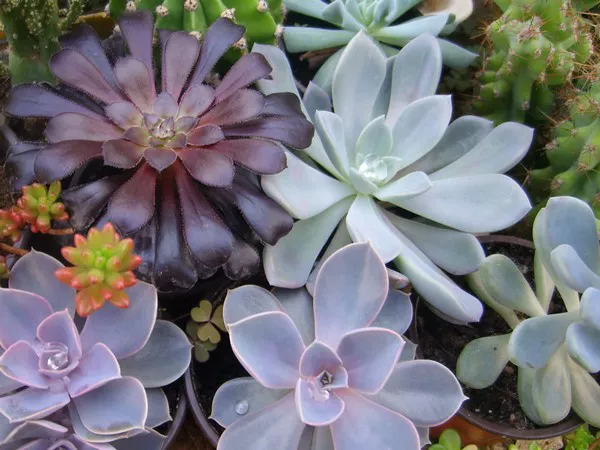Succulents, renowned for their resilience and unique aesthetic appeal, are favored by many plant enthusiasts. However, if you find that your succulents aren’t thriving as expected, it can be a source of frustration and concern. Understanding the reasons behind stunted growth or lack of vitality in succulents is crucial for addressing the issue and fostering a healthy, flourishing garden.
Inadequate Sunlight Exposure
Succulents are sun-loving plants, and insufficient sunlight exposure is a primary reason for their lack of growth. If your succulents are not receiving the recommended six hours of indirect sunlight per day, they may become etiolated, resulting in stretched, weak stems and sparse growth. Ensure that your succulents are placed in a location with ample sunlight, especially if you’re growing them indoors. If growing outdoors, monitor the shading caused by nearby structures or plants and adjust the positioning accordingly.
Overwatering or Underwatering
Watering practices significantly impact the health of succulents, and both overwatering and underwatering can hinder their growth. Succulents are adapted to arid conditions and prefer infrequent but deep watering. Overwatering can lead to root rot, causing the roots to suffocate and impeding nutrient absorption. Conversely, underwatering can result in dehydration and nutrient deficiency. Strike a balance by allowing the soil to dry out between watering sessions and tailoring your watering frequency to the specific needs of each succulent species.
Incorrect Soil Mix
The soil in which succulents are planted plays a crucial role in their growth. Succulents require well-draining soil to prevent waterlogging, as stagnant water in the soil can lead to root rot. If your succulents are planted in a dense, moisture-retaining soil mix, they may struggle to thrive. Opt for a specialized succulent or cactus mix that includes components like perlite or sand to enhance drainage. Repotting your succulents in suitable soil can often rejuvenate their growth.
Lack of Nutrients or Imbalanced Fertilization
Succulents have relatively low nutrient requirements, but they do benefit from periodic fertilization during the growing season. If your succulents are not growing as expected, it could be due to a lack of essential nutrients in the soil. Choose a balanced, water-soluble fertilizer specifically formulated for succulents and apply it at half or a quarter of the recommended strength. Avoid over-fertilizing, as excessive nutrients can lead to salt build-up in the soil, hindering nutrient absorption.
Inadequate Temperature Conditions
Succulents are adapted to a wide range of temperatures, but extreme conditions can impede their growth. If your succulents are exposed to temperatures that are too high or too low for their tolerance, they may exhibit signs of stress, such as slow growth or discoloration. Protect your succulents from extreme temperature fluctuations and frost, providing a stable environment that aligns with their preferred temperature range. Be mindful of seasonal changes and adjust care accordingly.
Pests and Diseases
Pests and diseases can compromise the health and growth of succulents. Common pests that affect succulents include aphids, mealybugs, and spider mites. These pests can sap nutrients from the plants and transmit diseases. Regularly inspect your succulents for signs of pest infestations, such as discolored or misshapen leaves, and take prompt action to address the issue. Treat pests with insecticidal soap or neem oil, and consider isolating new succulent additions for a few weeks to prevent introducing pests to your existing collection.
Improper Container Size
The size of the container in which succulents are planted can impact their growth. If the container is too small, the roots may become cramped, restricting their ability to spread and absorb nutrients. Conversely, excessively large containers can lead to overwatering, as the soil retains moisture for extended periods. Choose containers that allow for proper airflow and drainage, ensuring that they are proportionate to the size of the succulent. Repotting into appropriately sized containers can promote healthier growth.
Underlying Health Issues
Sometimes, the lack of growth in succulents may be attributed to underlying health issues. Inspect your succulents for signs of disease, such as rotting or discolored stems and leaves. Root rot, often caused by overwatering or poorly draining soil, can affect the overall health of succulents. If you suspect a health issue, carefully inspect the plant, trim away affected parts, and repot it in fresh, well-draining soil.
Etiolation Due to Low Light
Etiolation is a phenomenon where succulents stretch or become leggy due to insufficient light. If your succulents are not receiving enough sunlight, they may elongate their stems in an attempt to reach for light. This can result in weak, floppy growth. To rectify etiolation, move your succulents to a brighter location with more indirect sunlight. Prune any stretched stems and leaves to encourage compact growth.
Seasonal Dormancy
Many succulents experience a period of dormancy, usually during the fall and winter months. During this time, their growth naturally slows down, and they may appear to be stagnant. Adjust your care routine to accommodate the dormancy period, reducing watering frequency and avoiding fertilization. It’s essential to recognize the seasonal changes in your succulents’ growth patterns and provide the appropriate care during each phase of their life cycle.
Conclusion
Identifying the reasons why your succulents aren’t growing is a crucial step in revitalizing their health and promoting vigorous growth. By assessing factors such as sunlight exposure, watering practices, soil conditions, and pest management, you can address specific issues that may be hindering the growth of your succulents. Remember that succulents are resilient plants, and with the right care adjustments, you can enjoy a thriving and vibrant succulent garden. Observing your plants closely, tailoring your care routine to their individual needs, and making informed adjustments will contribute to the long-term success of your succulent collection.


